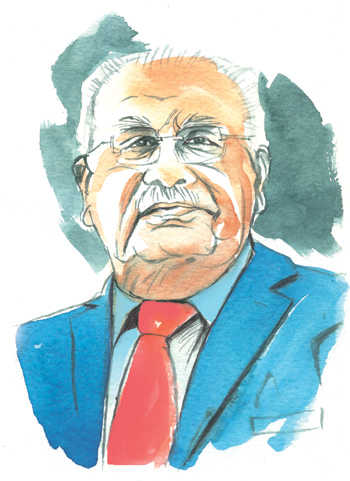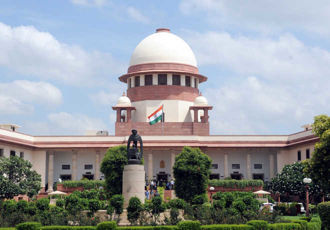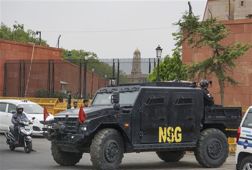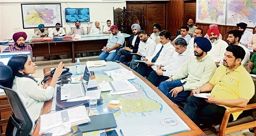
Illustration: Sandeep Joshi
Harish Khare
A man named Naresh Chandra passed away a few days ago, almost unsung and unnoticed. He was one of the finest public servants this country has produced since Independence.
This man had the unique distinction of holding three crucial positions in the Indian bureaucratic pantheon — defence secretary, home secretary and cabinet secretary. Discharge of responsibility came as easily to him as a fish takes to water. Unsurprisingly, he filled all these three slots with grit and determination because that was a very turbulent time of our republic — between 1989 and 1992 — when a concerted effort was made to demolish our secular structure.
That was a time when the mettle of our national elites was tested; it needed men like Naresh Chandra to remain unsentimental and clearheaded as to what this nation was all about and what it would take to preserve its core values and interests.
In America or any other established system, he would have been called a natural ‘establishment man’, or a ‘wise man.’ He belonged, effortlessly, to the court, but was never a courtier. And, he had the guts and the moral authority to tell a prime minister what would work and what would not work.
And, precisely because of these qualities, successive governments kept calling on him to help them find the nation’s way out of this or that mess.
He was one of those handful bureaucrats who did not allow themselves to be limited by the confines of bureaucracy. Naresh Chandra did not allow bureaucracy to define him. But then, neither was he overawed by the Indian politician. He believed that in a democracy, the politician was an unavoidable encumbrance. There were good politicians and there were bad politicians; the challenge in the service of the nation was to enlist the good ones and work around the bad ones.
Those who worked with him found that he invariably provided a “balance” — because he was a person who dealt with a problem rather than its politics or politicians behind the problem. He made a fine Ambassador to the United States, primarily because he was not from the Indian Foreign Service and, therefore, did not find himself burdened with that service’s factional distractions.
All his life, he had worked with the Congress governments and, therefore, could be labelled as “Congressman” — but he was at his best when he found himself as India’s Ambassador in Washington, defending the Vajpayee government’s decision to go nuclear. He was in a very hostile territory, but he cheerfully plugged away and ensured that India got away with little retribution by way of sanctions.
His last major assignment was to head a blue ribbon: the national task force on the Review of the Defence Management.
He was a bachelor, needed very little for himself and retired to a modest house in Vasant Kunj — but he was not averse to giving advice — for a price — to corporate houses. And, he was very clearheaded about this. His presence on a corporate board would help the ‘lalas’ elevate themselves, introduce best practices and occasionally flirt with noble ideas.
Above all, Naresh Chandra had tremendous clarity: pursue the substantial rather than the fashionable.
**************************************************
On Friday, The Tribune had published on the front page a telling photograph. It showed massive crowds that had gathered in Nagaur district of Rajasthan to pay respect to a gangster. He was believed to be a Rajput and it was reported that the community felt outraged that the gangster got killed in a fake encounter.
I found myself bantering with my senior colleagues in the editorial board as to how many mourners each one of us would be able to muster after we were summoned up there by the Big Man.
I could not help recalling the funeral of Brajesh Mishra, once a very, very powerful man; his cremation was attended by less than a hundred mourners.
So far, we have become accustomed to the phenomenon of hundreds of people making it a point of attending the militants’ janaza in Kashmir. Each such attendance constitutes a kind of political statement.
Now, the process is sought to be replicated in the heart of the Rajput land. A gangster becomes a respectable figure because someone grafts an identity and all his sins of omission and commission become irrelevant. Maybe, there is latent anger against the authority — and people are just looking for a spark.
We have been witnessing a creeping phenomenon of the collectivisation of violence. We are persuaded to believe that there is nothing wrong as long as violence is used and inflicted upon others in defence of a larger cause, say, a cow. During last year’s Jat agitation in Haryana, women folk were cheerfully pressed into the defiance of authority.
Now we have gone a step further. Communities are willing to own up a deadly man and his deadly deeds. We cannot serenade a gangster. He was no Robin Hood.
This celebration at Nagaur of a gangster should be a warning shot. Something terribly wrong is brewing in the kingdom of achhe din.
**************************************************
Increasingly, it is becoming clear that national security is an animal that cannot be easily tamed, even if the ringmaster claims to have certain physical measurements. There can be no joy as the nation stumbles upon this prosaic reality. National security is a complicated business, not much can be accomplished in this by braggadocios.
The importance of Vappala Balachandran's book, Keeping India Safe — The Dilemma of Internal Security, is that it drives home the point that infirmities in our national security apparatus have long been in the making and it would take a long time to fix this leaking ship, and that partisanship or ultra-nationalistic rhetoric would not do the trick. The fault-lines that we choose to incur today will come to haunt us years later.
In the introduction itself, Balachandran lets us know the lie of the land: “It is commonly understood that the Babri Masjid demolition and the 2002 Gujarat riots after the Godhra train burning were directly responsible for increasing jihadi terrorism in India, the casualties of which form a major portion of the total terrorism-related deaths in our country, estimated to be 65, 712 since 1994.” No one in the ruling establishment wants to be reminded of this unvarnished fact; and, if anyone dares raise this factor, he is shouted down as a “Muslim-appeaser.”
Balachandran’s central argument is that we shall continue to fall short in our internal security preparedness as long as police and law and order remained a ‘state subjec.’ When the framers of the Constitution were at work, they had to produce a kind of political consensus behind a very, very fragile unity that had been grafted upon reluctant principalities. The local-level leaders were unwilling to hand over the police — the key instrument of control and coercion — to the Centre. The regional politician’s calculus remains unchanged. Almost in state after state, every chief minister prefers to keep the ‘home’ portfolio with him.
And now, we have so much bad blood among the politicians that no state will willingly entrust control over police to the ruling party at the Centre. That means, as Balachandran argues, we shall invariably fail to achieve the requisite convergence and synergy while our enemies would have no inhibitions.
There is an engaging chapter on the “26/11” attack and why we failed to prevent the attack, despite reasonably actionable intelligence. Even more educative is how the system closed ranks to ensure that “failures” remained buried — and, unattended.
A useful book to have on the shelf.
This has been a grim week. Bad news on the China front, bad news from Kashmir. I shall happily offer a cup of coffee to anyone with cheerful news. Join me.


























